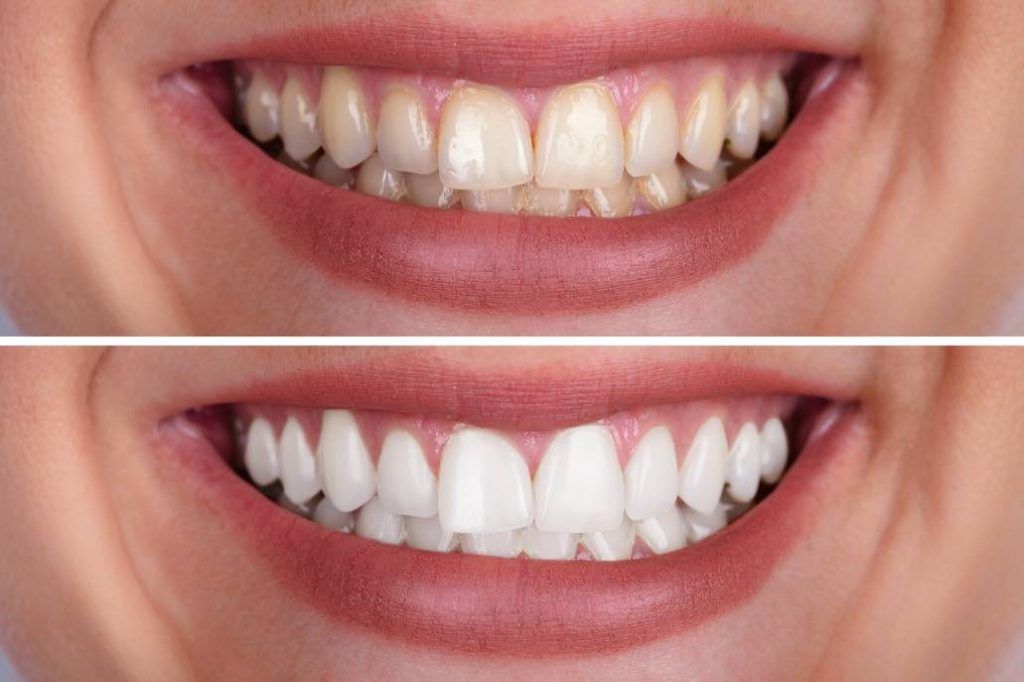
Teeth whitening is one of the most popular cosmetic dental procedures. It makes a big difference in the way your smile looks for a relatively small investment of time and money. But you may have heard that whitening can cause sensitive teeth or feel concerned about its impact on your oral health. Below, you’ll find out how teeth whitening works and why it causes temporary sensitivity in some people but not others. You’ll also get tips to alleviate sensitivity so you can have the beautiful results you want as comfortably as possible.
How Does Teeth Whitening Work?
Teeth whitening contains ingredients such as carbamide peroxide or hydrogen peroxide that penetrate the enamel and break up stains. The FDA limits the strength of over-the-counter products, so they aren’t as effective as professional options. Treatments from a dentist are also gentle and safe and contain special ingredients that minimize sensitivity and protect your enamel.
Here’s how 2 different professional options work, both of which will whiten your teeth by 3-7 shades:
In-Office Whitening
- This treatment gives you results in about 2 hours. A dentist will start by isolating and protecting your lips, gums, and cheeks.
- Then they’ll apply a powerful whitening gel to your teeth and expose them to a special light that accelerates the process. Throughout the process, they’ll be monitoring you to make sure you’re comfortable.
- Finally, you’ll get a fluoride treatment to minimize sensitivity.
Take-Home Trays
- This option is more gradual and takes about 2 weeks to get your final results. You can get started in just 2 visits.
- First, molds are taken to make custom trays that fit your teeth perfectly.
- Then you’ll return 1-2 weeks later to pick up your trays and a supply of whitening gel.
- Then you’ll wear your trays at home for 30-60 minutes a day until you get your final results (usually in 10-14 days).
Why Do Some People Get Sensitivity From Teeth Whitening?
Sensitivity occurs because the teeth are covered in hundreds of tiny pores that allow “information” like cold, heat and pressure to reach the nerve. Whitening temporarily opens these pores, which happens more in some people than in others because of simple genetics or heredity. This makes the nerves in their teeth more susceptible to stimulation from hot, cold, etc. However, when sensitivity does occur, it’s temporary.
In addition, there are some great ways to minimize sensitivity and still get excellent results.
How Can You Reduce Sensitivity When You Whiten?
- Make sure you get professional whitening – As mentioned earlier, professional whitening is not only more effective but also contains ingredients like fluoride that “plug” the pores in the teeth and strengthen the enamel. This coating blocks temperature and pressure from reaching the nerves of the teeth.
- Use sensitivity toothpaste and extra fluoride –Sensitivity formulas also contain beneficial ingredients (such as fluoride and potassium nitrate) that insulate the nerves during whitening. However, the effects are cumulative, so you may benefit from using it for 2-3 weeks before you whiten. A dentist can also give you a prescription toothpaste that’s specially designed for sensitivity that works much the same way.
- Take a gradual approach – For people who are especially prone to sensitivity, take-home whitening is often a great choice because you can customize it to your needs. Instead of wearing the trays every day, you can simply wear them every second or third day. You’ll still get great results, it will just take a bit longer.
Achieving a gorgeous smile shouldn’t be uncomfortable. With high-quality whitening from a dentist and a few simple strategies, everyone can get fantastic results – without sensitivity!
About the Author
Dr. Sheri McIntosh is a general and cosmetic dentist with over a decade of experience. She knows that a beautiful smile can change someone’s life and makes sure every patient gets great results from their whitening treatment. She also takes steps to help them stay comfortable throughout the process. If you’re interested in teeth whitening or have any questions, she can be reached via her website.
